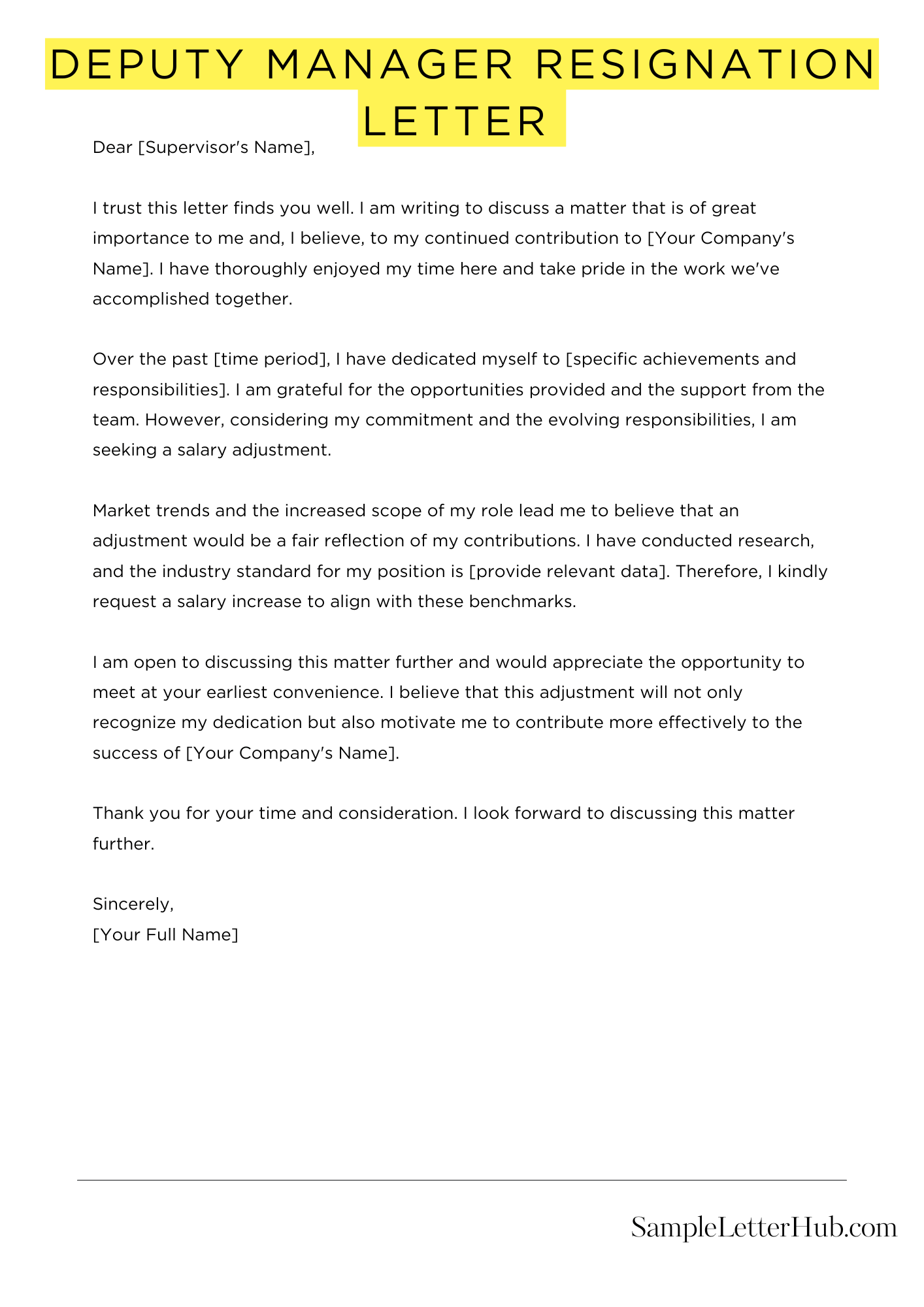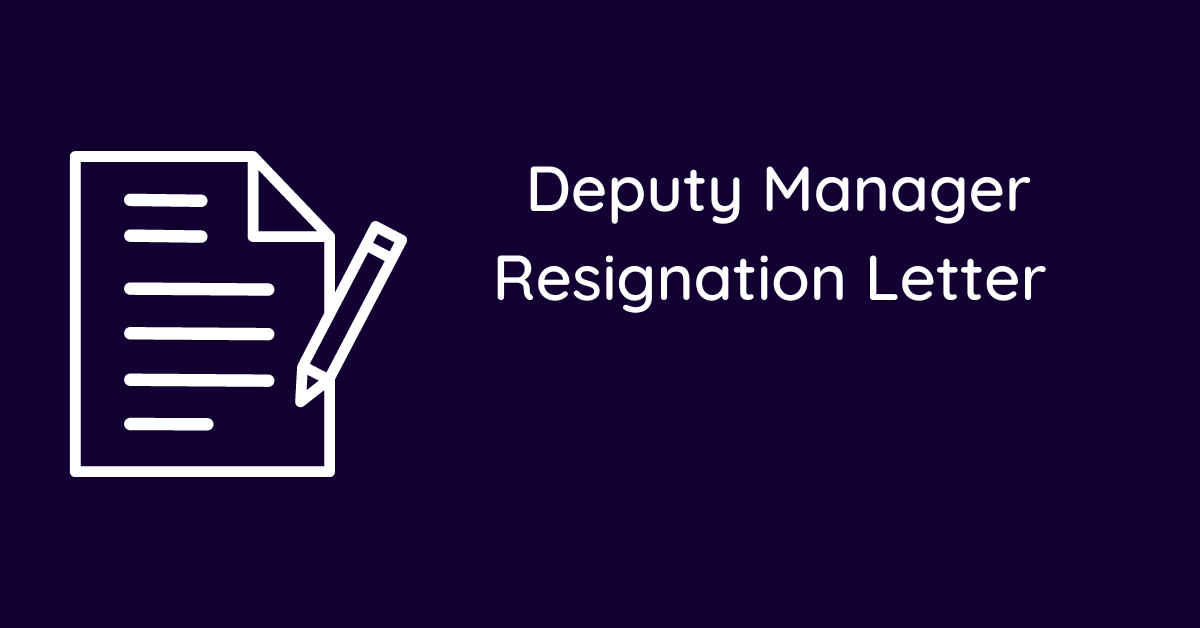When it comes to resigning from your position as a deputy manager, a well-crafted resignation letter is key. In this article, we’ll share an example of a deputy manager resignation letter to help you write a clear and professional letter that effectively communicates your decision to leave.
Remember, a resignation letter is not just a formality; it’s an opportunity to express your gratitude for the experience and growth you’ve gained during your time at the company. Be polite and humble in your tone, and take the time to thank your colleagues and superiors for their support.
Below, we’ve included a template/example deputy manager resignation letter that you can use as a starting point. Feel free to tailor it to your specific situation and add any additional details that you feel are relevant.
Deputy Manager Resignation Letter
Dear [Recipient Name],
Please accept this letter as formal notification that I will be resigning from my position as Deputy Manager, effective [last date of employment].
I have enjoyed my time at [Company Name] and am grateful for the opportunities and experiences I have gained during my tenure. I have valued the support and guidance I have received from my colleagues and superiors.
I wish you and the company all the best in the future.
Sincerely,
[Your Signature]
Short Deputy Manager Resignation Letter Sample
Please accept this letter as formal notification that I am resigning from my position as Deputy Manager at [Company Name]. My last day of employment will be [Your Last Day]. Thank you for the opportunity to grow and learn during my time here. I wish you and the company continued success. I am happy to assist in the transition process to ensure a smooth handover of my responsibilities.
I wish you all the best with your deputy manager resignation letter.
When it’s time to say farewell, expressing your gratitude and best wishes can make the transition smoother:

How to Write a Deputy Manager Resignation Letter
1. Start with a Formal Introduction
Begin your letter with a formal salutation, such as “Dear [Manager’s Name].” Clearly state your intention to resign from your position as Deputy Manager, including the date your resignation will take effect.
2. Express Gratitude and Appreciation
Take this opportunity to express your gratitude for the opportunities and experiences you’ve gained during your time at the company. Highlight any specific projects or initiatives you’ve been involved in and how they’ve contributed to your professional growth.
3. State Your Reasons for Leaving
While it’s not necessary to go into excessive detail, briefly state your reasons for leaving. Whether you’re seeking new challenges, pursuing further education, or simply seeking a change of pace, be honest and professional in your explanation.
4. Offer to Assist with the Transition
Demonstrate your commitment to a smooth transition by offering to assist in any way possible. This could include training your replacement, providing documentation, or sharing your knowledge and expertise.
5. End with a Professional Closing
Conclude your letter with a formal closing, such as “Sincerely,” followed by your typed name. You may also include a handwritten signature if you’re sending a physical letter.
6 Most Frequently Asked Questions About Deputy Manager Resignation Letters
When it comes to resigning from your position as a Deputy Manager, there are a few key questions that you may have. Here are the 6 most frequently asked questions and their answers:
1. What is the proper format for a Deputy Manager resignation letter?
A Deputy Manager resignation letter should follow a formal business letter format. It should include your name, address, date, company name, and the recipient’s name and title. The body of the letter should state your intention to resign from your position and your last date of employment. You can also include a brief statement of appreciation for the opportunity to work at the company.
2. What should I include in my resignation letter?
In addition to the basic information mentioned above, you may also want to include the following in your resignation letter:
- A statement of your reasons for leaving (optional)
- An offer to help with the transition
- A thank-you note to your manager and colleagues
3. How much notice should I give?
The amount of notice you should give will vary depending on your company’s policy and your relationship with your manager. However, it is generally considered good practice to give at least two weeks’ notice.
4. What should I do if I am asked to stay?
If you are asked to stay, it is important to be polite and professional. You can explain your reasons for leaving and reiterate your decision. However, it is ultimately up to you to decide whether or not you want to stay.
5. What if I have a non-compete agreement?
If you have a non-compete agreement, it is important to review it carefully before resigning. You should make sure that you understand the terms of the agreement and that you are not violating them by taking a new job.
6. What are some tips for writing a resignation letter?
Here are a few tips for writing a resignation letter:
- Keep it brief and to the point.
- Be formal and professional.
- State your reasons for leaving (optional).
- Offer to help with the transition.
- Thank your manager and colleagues.
Before making the decision to resign from your job, it’s essential to consider the legal aspects:
Understanding your emotions after quitting your job is important. Explore why you might be feeling sad:
Related
- Resignation letter sample
- Forced resignation letter
- Resignation letter due to going abroad
- Resignation letter due to marriage
- Resignation letter due to other opportunity
- Resignation letter due to mistake

